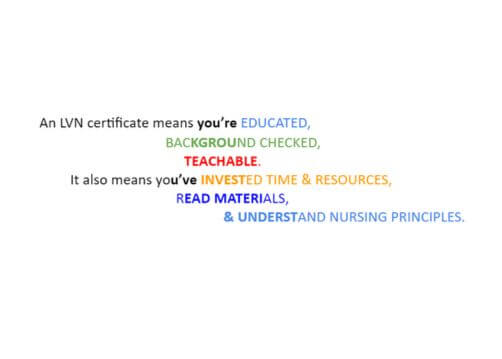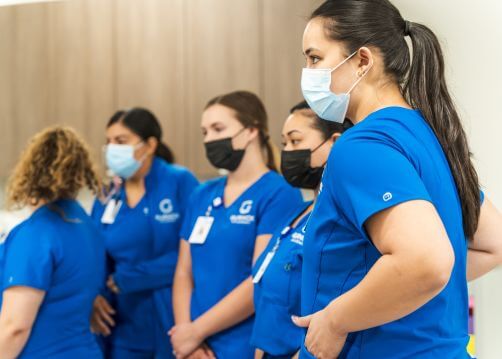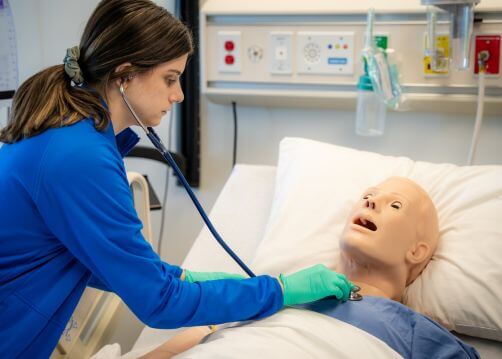LVN Programs
Date: July 22, 2022
Not all universities offer nursing degree programs, and most students who pursue a nursing career typically enroll in Vocational Nurse (VN) programs or schools. A Vocational Nurse program generally takes one year to complete, and upon completion and certification of the NCLEX-PN, one may begin to practice as a nurse. Depending on one’s lifestyle and work needs, this vocation can allow one to finish a professional course and start earning money while their peers may still be in school. Further, one can make a modest living in the profession1 while performing vital health and wellness services.
Looking for a Good VN Program
When looking for the perfect Vocational Nurse program, one of the best places to begin is on the Internet to compare educational programs. What strengths does each bring? How do these fit with your current needs and lifestyle? It is common for Vocational Nurse programs to use social media, online comment forums, and rating systems.
Ask, “What are healthcare agencies and partners saying about this Vocational Nurse program? How is it rated?” (Keep in mind all schools have some negative press at one time or another.) The critical question to ask when filtering information is, “Can this school meet my current academic needs?” Here are some other suggestions to aid you in your search to find an excellent Vocational Nurse program.
Some Steps to Take
1. Contact the Admissions Department
Contact a prospective school’s admissions department. Admissions professionals will likely be more than happy to speak with you. (Remember, admissions personnel are trained to answer your inquiries.) These professionals can connect you to academic Vocational Nurse program resources, make course outlines available, provide program-specific brochures (digital and hard copy), offer written Q & A’s, and provide appropriate program materials. They will also likely arrange a physical/virtual campus tour for you.
Tours can provide the “pulse” of a campus, highlight professors, introduce one to staff, and allow one to meet future colleagues. Additionally, admissions personnel alert you and help you register for program information sessions that explain course fundamentals by live individuals. These professionals may also guide you to program-specific orientations and meetings.
2. Check Out Career Services
Additionally, most colleges and vocational schools have career services departments that house information about the vocation you are pursuing and its current requirements per state. Make the most of career services. Often, they are abreast of industry standards and trends, tracking successful influencers in the field. These professional spotlights can serve as inspiration as you consider program benchmarks. Career service departments also keep track of alum, highlighting their accomplishments and successes, making information available to help as mentorships for selecting the right program.
Most people bristle against email signups, fearing SPAM or unwanted “junk mail.” However, signing up for industry e-newsletters or event notices in one’s chosen field can be advantageous. Communications typically provide educational pathways, tips, shortcuts, and essential trade information. They have the potential to help you make better-informed decisions regarding program selection.
3. Speak with Someone
Consider speaking with a currently working licensed vocational nurse about their experiences and where they received their training. Discussing your thoughts and concerns with a working LVN may prove valuable when selecting your program. The opportunity may present itself at your next wellness checkup. It may be that friendly face in scrubs taking your blood pressure or the Licensed Vocational Nurse that lives just down the street. Often people don’t mind talking about what they do. Be respectful of others’ time, yet knowing a real-life person who has already taken the program can be a wealth of information you may not easily find performing online research.
4. Try Out the Field
If you’re not sure a Vocational Nurse program is for you, you may want to try working as a certified nurses’ assistant (CNA) first. While the duties won’t be entirely the same as a Licensed Vocational Nurse, acting as a CNA is an excellent way to get a taste of work within a wellness community. This can go far in familiarizing oneself with the vocational nursing basics and provide insight for seeing if a Vocational Nursing program is right for you.
5. Do Some Research
You will undoubtedly find a program that works with a bit of research and effort. Once you do, you can expect to fill out enrollment forms and go through specific entrance requirements. The right institution or learning platform will have people to aid you in these choices.
Every day, Gurnick Academy of Medical Arts helps future students make these transitions smoothly and graduates vocational nurses every year. To speak with a Gurnick Admission Advisor or Career Services member, click these links or call 1-877-GURNICK.~
Find Out Who We Are
Gurnick Academy of Medical Arts is a private post-secondary academy offering quality allied health and nursing programs operating six campuses in California with locations in San Mateo, Modesto, Fresno, Concord, Sacramento, and Van Nuys. Gurnick Academy offers allied healthcare, nursing, and medical imaging programs, including vocational nursing, to more than 2,500 students annually.
Citation:
1 Bureau of Labor Statistics, US Department of Labor, Occupational Outlook Handbook, Licensed Practical and Licensed Vocational Nurses. (Accessed July 22, 2022.)






